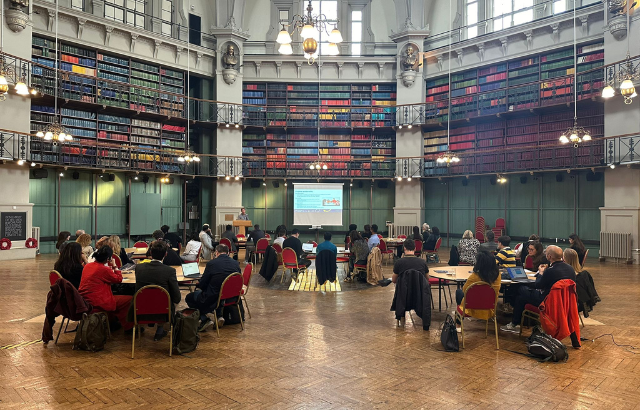Queen Mary’s SKETCH Symposium 2024 Brings Together Higher Education Professionals for Knowledge Sharing
SKETCH empowers students to work directly with local businesses, individuals, and community partners to address real-world challenges. Through workshops, training, advisory clinics, and consultancy-style projects, students deliver valuable services while gaining practical experience.
Held earlier this summer at Queen Mary University of London, the SKETCH Symposium 2024 focused on the expanding field of student knowledge exchange. The event featured interactive sessions led by Queen Mary’s student exchange practitioners, who shared their expertise and engaged in meaningful Q&A sessions with attendees.
The symposium began with a warm welcome from SKETCH Academic Lead, Dr. Patrick McGurk, Reader in Management Practice and Associate Dean of Education in the School of Business and Management at Queen Mary University of London. Dr. McGurk set the stage for the thought-provoking discussions that followed.
“The SKETCH Symposium 2024 has highlighted the transformative power of student knowledge exchange. By connecting students with real-world challenges, we are not only enhancing their academic experience but also driving positive change in our communities,” Dr. McGurk remarked.
Highlights of the Symposium
- Student Knowledge Exchange: How Best to Set Students Up for Success
Karen Watton, Senior Lecturer in Clinical Legal Education and Director of qLegal, provided insights into the highly successful qLegal programme.
“The qLegal programme exemplifies how real-world experience can transform our students’ educational journey. Through hands-on projects, they not only apply their knowledge but also develop invaluable professional skills,” Watton said.
- Assessing SKE in the Curriculum/Student Reflection
Frances Ridout from the Queen Mary University of London Legal Advice Centre discussed methods for assessing student knowledge exchange within the curriculum.
“Incorporating knowledge exchange into our curriculum not only enriches our students’ learning experience but also ensures they are better prepared to meet the demands of the professional world,” Ridout noted.
- Best Practices: Purpose-Led Knowledge Exchange and Social Value
Dr. Joanne Zhang from the School of Business and Management Hub explored how purpose-driven knowledge exchange initiatives create social value.
Dr Zhang provided insights into Project ReMAKE, which is a 6 to 8-week entrepreneurship training programme for formerly incarcerated people, that seeks to prepare them to re-enter employment.
“Purpose-led knowledge exchange initiatives not only benefit the community but also instil a sense of social responsibility and purpose in our students,” Dr Zhang commented.
- Best Practices: How to Deliver Successful Interdisciplinary Student Knowledge Exchange Programmes
Dr. Aisa Abeulmaatti from qTech and Dr. Leon Vinokur from qNomics shared best practices for interdisciplinary student knowledge exchange programmes.
“Interdisciplinary knowledge exchange programmes harness the strengths of diverse fields, fostering innovation and comprehensive problem-solving among students,” Dr. Abeulmaatti explained.
- World Café: Sharing Best Practice Across Institutions
An interactive session for attendees to share best practices and foster collaboration.
“The World Café session was a fantastic opportunity to exchange ideas and strategies with colleagues from different institutions. It was inspiring to see the collective commitment to advancing student knowledge exchange,” Dr. Patrick McGurk commented.
Looking Ahead
The SKETCH Symposium 2024 has once again demonstrated the importance and impact of student knowledge exchange. By fostering collaboration between students, academic staff, and community partners, Queen Mary University of London is paving the way for innovative solutions to real-world problems. The recent recognition with the London Higher Award for Outstanding Contribution to Student Employability underscores SKETCH’s role in preparing students for successful careers.
Evie Edwards, SKETCH (Student Knowledge Exchange Through Community Hubs) Manager concludes: “As we look to the future, SKETCH will continue to expand its reach and deepen its impact, driving forward the mission of knowledge exchange. We invite all members of the academic community to join us in this exciting journey, contributing to and benefiting from the vibrant network of practice.”
The SKETCH programme is delivered by six pillars of activity, involving the disciplines of law, finance, business and management, computer science and more. These pillars also work together to deliver interdisciplinary projects.

